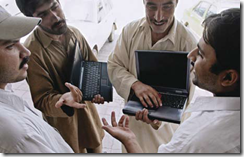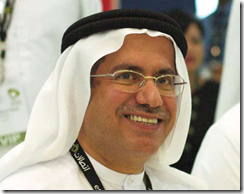Etisalat, like most of the leading telecom providers from the region, is entering into uncharted territories as it looks to balance mild global economic resurgence with the need to extract value from a growing tapestry of assets. The telco’s chairman, Mohammed Omran acknowledges that 2010 and beyond shall be a challenging time for the corporation, but believes given its track record, experience and determination to innovate, a successful outcome is achievable
Mohammed Omran says prudence and the ambition to add value to the group are the premises on which Etisalat formulates its expansion strategy
“We look to 2010 with a combination of confidence and interest, and expect the year to throw up many challenges,” says Mohammed Omran, recognising that telcos today are operating in an environment that is significantly altered to the traditional telecom sector of old. “Change in the world of telecommunications is a constant factor with new business models, and different technologies converging.”
Etisalat will face the year ahead with a measure of confidence brought about by its strong financial performance during the course of 2009, despite the global economic slump. The corporation reported net profit of AED8.84 billion (US$2.41 billion) on revenues of AED30.83 billion, up 16 per cent and five per cent respectively year-on-year. Etisalat counted 94 million subscribers across 18 markets, having entered 10 of those territories in only the past five years.
In those five years, the climate surrounding Gulf operator-fuelled expansion has altered immensely, from a rush to add scale in new regions, to a chess-like review of what next move makes the most strategic sense and how should it best be executed.
“Going forward we should expect to see more emphasis on accelerating decision making and execution”, comments Zoran Vasiljev, partner at Value Partners. “There will be shortened time-to-market and launch timelines, strengthening of management talent, and a renewed focus on key accounts and innovation.”
Etisalat continues to remain bullish about its international plans, with an aim to increase income from operations outside of the UAE from 10 per cent currently to around 50 per cent of overall revenues over time.
“Asia and Africa remain our focus areas for expansion,” asserts Omran. “These are markets with high populations and low technology penetration. They are ripe for the many new technologies and value added services that we are introducing to the region.”
Indeed at the beginning of February Etisalat announced it had acquired the remaining shares of African operator Atlantique Telecom for US$75 million, thereby gaining full control of the operator. Etisalat first acquired a 50 per cent stake in Atlantique in 2005, along with management rights until April 2015, and has steadily increased its equity in stages. The completion of the acquisition was executed through the purchase of an outstanding 18 per cent of shares. The West African company gives Etisalat access to seven countries in West Africa, namely: Ivory Coast, Gabon, Niger, Benin, Burkino Faso, Togo and Central African Republic.
At the same time as it announced its further investment in Atlantique Telecom, Etisalat also detailed its application to raise its equity in Indian subsidiary Etisalat DB to 50 per cent plus one share. Etisalat filed an application in December with India’s Foreign Investment Promotion Board (FIPB) for a planned increase in equity of Etisalat DB, from its current 44.73 per cent shareholding to 50 per cent and is currently awaiting regulatory approval for the proposal. Etisalat originally paid US$900 million for the stake in Swan Telecom in 2008, before renaming the entity Etisalat DB in June last year. Etisalat DB holds licences to provide telephony, Internet and broadband services in 15 telecommunications circles across India, covering a population footprint of more than 900 million. The company is headquartered in Mumbai and is yet to launch services.
“We shall soon start our operations in India, one of the largest telecom markets in the world and have just applied to acquire a controlling stake,” Omran says. “We plan to invest in the company to ensure it has the dynamism to take the leading position in the market in the next few years and that it continues its role in the development and growth of the telecom sector.”
Etisalat’s ongoing appetite for investments into Africa flies in the face of the strategies being adopted by a number of its peers, which have suggested that making money in the African context is a difficult thing to achieve. Zain, the early flag bearer of Gulf investment in Africa’s telecom sector has seen some of its operations on the continent struggle to justify the premium they were acquired at, resulting in a half-hearted attempt to flog the entire business off to Vivendi last year. MTN Group, Africa’s leading mobile operator was involved in frustratingly long and fruitless merger negotiations with Indian operator Bharti Airtel in 2008 and 2009, driven as much perhaps by MTN management’s desire to cash-out of their stakeholdings as it was by a belief perhaps that in isolation the telecom market in Africa enjoys only limited upside.
 Industry convergence and the pursuit of non-core activities are challenges Etisalat, like other telcos, has to devise strategies to overcome
Industry convergence and the pursuit of non-core activities are challenges Etisalat, like other telcos, has to devise strategies to overcome
Jamal Al Jarwan, the head of Etisalat’s international investments arm is convinced positive growth prospects still exist in Africa and parts of the Middle East, and late last year said Etisalat was considering expansion into Libya, Syria and Lebanon, amongst other markets. Etisalat has offered LYD1 billion (US$825 million) in a “comprehensive offer” for the right to operate Libya’s third mobile licence. Al Jarwan confirmed last year that Etisalat had submitted a technical, financial and commercial offer for the licence in Libya, with the investment potentially reaching around LYD1 billion. The announcement from the Libyan government is expected imminently.
Lebanon, which has two state-owned telecom operators, is once again seeking to privatise the business, which is a development of interest to Etisalat. The UAE operator also intends to participate in the privatisation of Syria’s sole mobile operator.
The timing of Etisalat’s zest for foreign investments aligns well with the growing level of competition that exists for the telco in its domestic market. There is no cause for concern though, but competitive prudence is required. Etisalat counted more than 7.74 million mobile lines in the UAE in 2009, an increase of six per cent year-on-year. Fixed line subscribers numbered 1.31 million, while the telco’s Internet customer base rose 16 per cent to reach 1.33 million end-December.
Market competitor Du is ramping up competitive pressure in the market. During the course of 2009, CEO Osman Sultan said he wanted to see the operator garner a greater stake in the post-paid and enterprise market in the country, which has traditionally been Etisalat’s strongest and most profitable market segment. Earlier this month Du introduced a homephone recharge service, allowing subscribers to prepay credit on any home landline in the country, regardless of provider, and make local and international calls at attractive rates. Such offers encroach further onto Etisalat’s domestic stronghold, requiring the incumbent to look to innovate through what it offers domestically and the opportunities it pursues internationally.
“Services such as financial remittance services, which bring banking services into reach of all segments of the community, are of interest to us,” Omran says. “We foresee an area of significant growth potential in mobile commerce. Applications in m-commerce present an excellent opportunity for us to capitalise, given that Etisalat is already a known technology leader in the region.”
As early as mid-2008, Etisalat began piloting a mobile money transfer application between the UAE and India, in cooperation with Mashreqbank, Tata Communications (formerly VSNL ), Idea Cellular and HSBC India. The service enables Indian expatriates in the UAE to transfer money to their relatives in India through Idea Cellular, with Tata Communications being the central hub for the service.
“We have initiated certain steps, including our tie-up with some of the national banks. Through this we aim to revolutionise banking technology in a pilot programme enabling customers to make day-to-day purchases and pay for them using their mobile phones,” Omran explains.
Given the pace of change occurring in the telecom sector, and new directions service providers are undertaking, Etisalat is looking to embrace the divergent opportunities that are set to exist in the near-future. For example the telco continues to develop its portfolio of non-core services through Etisalat Services Holding. This suite of services extends to businesses as diverse as SIM card manufacturing; submarine cable maintenance and deployment; training and education; roaming clearing house; facilities management; as well as directory enquiry services and land cabling projects. Each of these non-core activities is being prepared to help fuel Etisalat’s growth and keep it in line with global developments.
Etisalat has been pursuing an ambition to “become a top 10 operator globally by 2010,” and though the telco is unlikely to achieve this milestone with respect to revenues or subscriber numbers, the span of its geographic presence is likely to catapult it to the top tier of global service providers.
“Over the coming period Etisalat will work to leverage its scale to drive synergies, innovate and grow new businesses, transforming to achieve operational excellence and expand internationally to further build scale,” says Omran. “This will help us achieve our ambition to be the service provider of choice in each market we operate and become a leading global telecom player – delivering top quality services and innovation, driven by empowered people.”






0 comments ↓
There are no comments yet...Kick things off by filling out the form below.
Leave a Comment